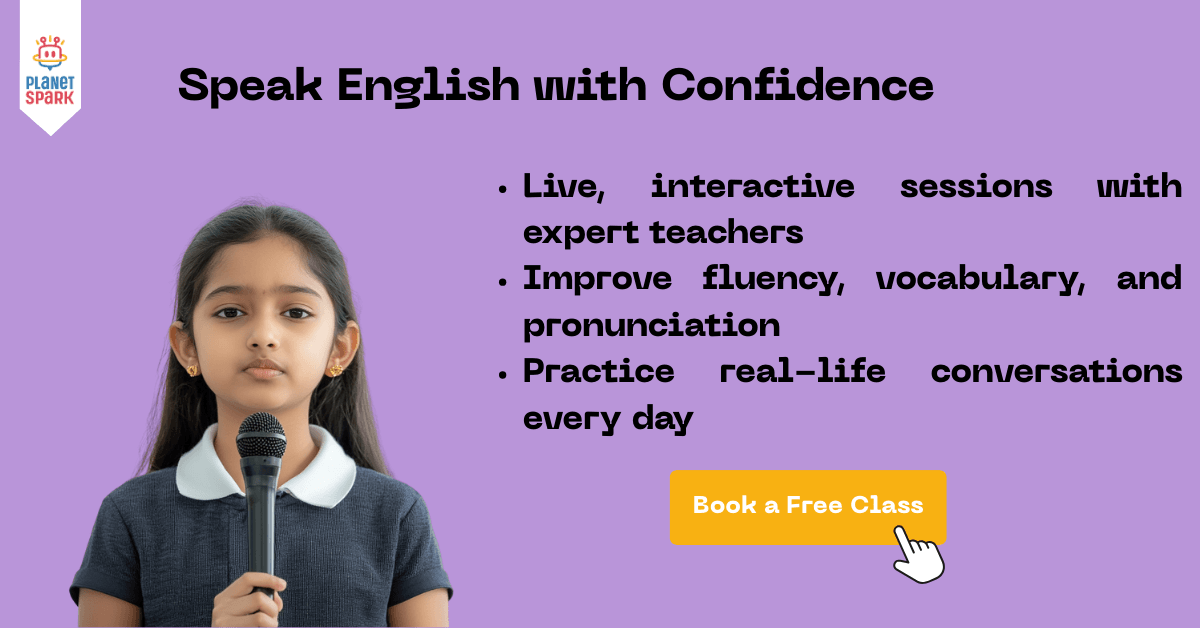7 Activities to Improve Communication Skills for Preschool Kids
Last Updated At: 18 Aug 2025
10 min read

Table of Contents
- Why Communication Skills Matter for Preschool Kids
- 7 Fun Activities to Improve Communication Skills
- Tips for Parents to Encourage Daily Communication
- How Communication Skills Shape Early Learning
- Common Challenges in Preschool Communication
- The Role of Teachers and Parents in Communication Growth
- Build Strong Communication with PlanetSpark’s Spoken English
Good communication skills help preschool kids express themselves clearly, build confidence, and connect with others. At this age, children learn best through fun and play-based activities. Parents and teachers can guide them with simple exercises that make speaking and listening natural parts of their day. In this blog, we will explore seven exciting activities to improve communication skills for preschool kids. These ideas are easy to do at home or in the classroom and will help children become confident speakers and attentive listeners.
PlanetSpark’s Spoken English course makes kids fluent and expressive.
👉 Book Your Free Demo Today
Why Communication Skills Matter for Preschool Kids
Communication is more than just talking. For preschool kids, it includes listening, understanding, expressing emotions, asking questions, and sharing ideas. Strong communication skills help children:
Build friendships and socialize confidently.
Express needs, feelings, and thoughts clearly.
Develop better vocabulary and language fluency.
Perform well in school through speaking and listening.
Grow confidence in public speaking from a young age.
When kids practice communication early, they carry these skills into every stage of life. Activities to improve communication skills for preschool kids are important because they give children a safe, fun way to learn while enjoying themselves.

7 Fun Activities to Improve Communication Skills
Here are seven simple and enjoyable activities to improve communication skills for preschool kids. Each activity encourages speaking, listening, and vocabulary development in natural ways.
1. Storytelling Sessions
Storytelling is one of the most powerful ways to improve communication skills in preschool kids. Children love listening to stories, but when they get a chance to tell their own, they develop confidence in speaking.
How to do it:
Read a short story with pictures.
Ask your child to retell the story in their own words.
Encourage them to add details, change the ending, or describe characters.
For younger preschoolers, let them use simple sentences.
Why it works:
Storytelling builds vocabulary, memory, and imagination. It helps children learn how to structure thoughts, use descriptive words, and express emotions through words.
2. Show and Tell
Show and Tell is a classic preschool activity to improve communication. Children bring an object from home and talk about it in front of others.
How to do it:
Ask your child to pick their favorite toy, book, or picture.
Let them describe what it is, why they like it, and how they use it.
Encourage them to use new words like “soft,” “colorful,” or “interesting.”
Why it works:
This activity improves confidence in speaking to a group. It teaches children to organize thoughts, speak clearly, and maintain eye contact. Preschool kids learn how to express their feelings and explain things in detail.
3. Picture Talk
Pictures can spark conversations and improve observation skills. Picture Talk is a simple way to encourage preschool kids to describe what they see.
How to do it:
Show your child a picture from a book, magazine, or flashcard.
Ask open-ended questions like: “What do you see?” or “What is happening here?”
Guide them to describe people, actions, colors, and emotions in the picture.
Why it works:
Picture Talk helps kids practice describing objects and situations. It improves vocabulary, imagination, and sentence formation. Since children love visuals, they stay engaged while learning to talk in full sentences.
Simple activities + expert guidance = confident speakers.
👉 Enroll Now and Start the Journey
4. Role-Playing Games
Role-playing allows preschool kids to act out real-life situations. By pretending to be a teacher, doctor, shopkeeper, or parent, children learn how to use language in different situations.
How to do it:
Choose a role (like doctor and patient).
Provide simple props such as a toy stethoscope or play money.
Encourage kids to use phrases they might hear in real life, such as “How can I help you?” or “Please pay here.”
Why it works:
Role-play develops vocabulary and helps children learn polite phrases, questions, and responses. It makes them confident in social communication and everyday conversations.

5. Rhymes and Songs
Preschool kids love music and rhythm. Singing rhymes and songs helps improve listening, pronunciation, and memory.
How to do it:
Sing classic rhymes like “Twinkle Twinkle” or “Row Row Row Your Boat.”
Add actions or claps to make it more engaging.
Encourage kids to sing along and repeat after you.
Why it works:
Rhymes and songs improve speech clarity and rhythm. They also help children remember new words, practice sounds, and develop listening skills. Singing together builds confidence and makes learning joyful.
6. Listening Games (like Simon Says)
Listening is as important as speaking. Games like “Simon Says” are fun and effective for developing listening skills in preschoolers.
How to do it:
Play “Simon Says” by giving simple instructions like “Simon says touch your nose.”
Mix instructions with and without “Simon says.”
Reward kids for listening carefully and following correctly.
Why it works:
Listening games teach children to pay attention, process words, and follow directions. This builds patience and improves their ability to respond correctly in conversations.
Boost communication with fun learning and live classes.
👉 Book a Free Class Today
7. Puppet Play
Puppets capture a child’s attention and make communication playful. Kids can use puppets to express feelings, tell stories, or role-play conversations.
How to do it:
Use simple hand puppets or make your own with socks or paper bags.
Create short dialogues between puppets.
Let your child take over and give voices to characters.
Why it works:
Puppet play improves imagination, creativity, and dialogue skills. It allows shy kids to express themselves without fear. Preschool kids gain confidence while talking through a puppet character.
Tips for Parents to Encourage Daily Communication
Activities alone are not enough. Parents play the most important role in helping preschool kids improve communication skills. Here are some easy tips:
Ask open-ended questions: Instead of yes/no questions, ask “What did you play today?” or “How was your snack?”
Encourage storytelling at home: Let kids share daily experiences in their own words.
Build vocabulary naturally: Use new words in conversation and explain them.
Model good communication: Speak clearly, listen patiently, and respond positively.
Reduce screen time: More face-to-face conversations mean stronger language growth.
Communication is the foundation of learning, relationships, and confidence. Preschool is the best time to nurture these skills with fun and interactive methods. These seven activities to improve communication skills for preschool kids—storytelling, show and tell, picture talk, role-playing, rhymes, listening games, and puppet play—are simple but powerful ways to help children grow.
By practicing daily and encouraging kids to express themselves freely, parents and teachers can make communication a natural and enjoyable skill. With strong communication abilities, preschool kids step into the world with confidence, curiosity, and joy.
Practice at home, progress with PlanetSpark’s sessions.
👉 Join PlanetSpark – Free Demo Available
How Communication Skills Shape Early Learning
Preschool years are the foundation for a child’s learning journey. Communication skills help children express themselves and understand new concepts more easily.
When children listen carefully, they follow instructions better and perform well in classroom activities. Speaking clearly builds confidence in answering questions and participating in group discussions.
Early communication practice also develops vocabulary, which supports reading and writing skills later. It encourages curiosity, as children begin asking questions and seeking answers. This improves problem-solving abilities.
Activities to improve communication skills for preschool kids also prepare them for social settings. They learn to share ideas, take turns in conversations, and respect others’ opinions. This balance of speaking and listening gives them a strong start in academics and personal growth.
Common Challenges in Preschool Communication
Not all preschool kids develop communication skills at the same pace. Some children may be shy and hesitate to speak. Others might struggle with pronunciation or forming sentences.
Limited vocabulary can make it difficult for them to express thoughts clearly. In some cases, children may listen but not respond, which affects confidence.
Another common challenge is short attention span. Kids may lose interest quickly in conversations. Parents often worry when children mix languages or avoid speaking in new environments.
These challenges are natural at an early age. With consistent encouragement, fun activities, and interactive learning, children can overcome them. Daily conversations, reading aloud, and playful communication games help kids feel safe and motivated to talk. Recognizing challenges early allows parents and teachers to guide preschoolers gently toward confident speaking.

The Role of Teachers and Parents in Communication Growth
Parents and teachers play a major role in developing communication skills in preschool kids. At home, parents provide the first language environment through daily interactions. Simple conversations about food, playtime, or bedtime stories help kids practice words naturally.
Teachers create structured opportunities like group discussions, storytelling circles, and show-and-tell sessions in the classroom. Both parents and teachers should use open-ended questions, praise efforts, and give children time to express themselves without interruption.
A safe and supportive environment makes kids more willing to talk. Regular practice, patience, and encouragement ensure that children do not feel pressured.
When parents and teachers work together, kids learn to use language confidently in different settings. This teamwork builds a strong communication foundation that supports the child throughout school and life.
Build Strong Communication with PlanetSpark’s Spoken English Course
If you want your child to go beyond simple activities and gain lifelong speaking confidence, PlanetSpark’s Spoken English course is the perfect choice. Our live, interactive sessions are designed to help kids improve fluency, vocabulary, and pronunciation through fun, real-life conversations. Children practice role-plays, dialogues, and everyday communication scenarios that make them confident speakers both at home and in school.
With expert guidance, instant feedback, and engaging activities, your child will not only speak clearly but also enjoy learning English. Help your preschooler build a strong communication foundation today with PlanetSpark’s Spoken English program.
Role-plays and games build lifelong English fluency.
👉 Enroll Your Child Today
Frequently Asked Questions (FAQs)
1. What are the best activities to improve communication skills for preschool kids?
Some of the best activities include storytelling, show and tell, picture talk, role-playing, rhymes, listening games, and puppet play. These activities make learning natural and fun.
2. How can parents improve their preschooler’s communication skills at home?
Parents can ask open-ended questions, encourage storytelling, read aloud daily, and practice simple games like “Simon Says.” Consistent conversations help children build confidence.
3. Why are communication skills important for preschool kids?
Good communication skills help children express thoughts, build friendships, improve vocabulary, and gain confidence in both school and social situations.
4. What is PlanetSpark’s Spoken English course for kids?
PlanetSpark’s Spoken English course is a live, interactive program where children build fluency, pronunciation, and vocabulary through real-life conversations, role plays, and engaging activities.
5. How is PlanetSpark’s Spoken English course different from other programs?
Unlike passive video lessons, PlanetSpark offers live classes with expert teachers, instant feedback, and practical speaking opportunities. Kids learn to speak confidently in everyday situations.
6. Can preschool kids join PlanetSpark’s Spoken English course?
Yes, the course is designed to suit young learners. The sessions are fun, engaging, and interactive, making it easy for preschoolers to improve their communication skills step by step.
Personalized Communication Report
Record a video to get a AI generated personalized communication report for your child
Select Learner's Class

Hi There, want to try these
tips for your child with
LIVE with our expert coach?
Let's check your child's
English fluency
